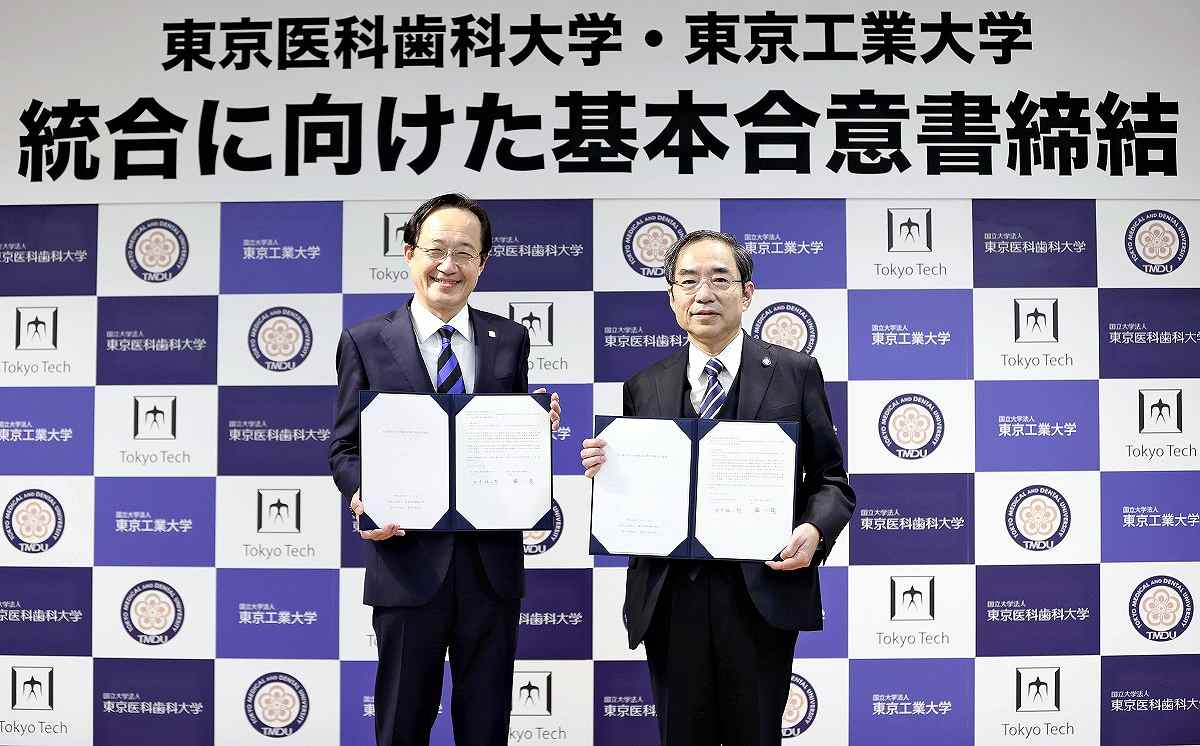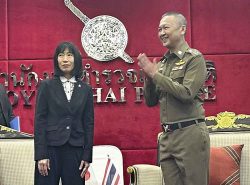Japan’s Tokyo Tech, TMDU Aim to Develop Next-Generation Drugs with Joint Research Organization Ahead of Merger

Tokyo Institute of Technology President Kazuya Masu, left, and Tokyo Medical and Dental University President Yujiro Tanaka display their agreement to integrate the two universities in Tokyo in October 2022.
17:52 JST, August 27, 2023
Tokyo Institute of Technology and Tokyo Medical and Dental University, which will be integrated to create a new university in the next fiscal year starting April, plan to establish a joint research organization this calendar year to develop next-generation drugs effective against diseases such as dementia and cancer, according to sources.
Tokyo Tech, which has superior technology in drug synthesis, and TMDU, known for its advanced medical research, intend to maximize the effects of their merger by taking advantage of each other’s areas of expertise. Ahead of their merger to establish the Institute of Science Tokyo, this is their first initiative in medical and engineering collaboration, under which the envisaged organization will work together with pharmaceutical companies in order to link the results of its research to the creation of new industries.
The joint research organization is expected to be a consortium for middle molecule drug discovery, sources said. The consortium will aim to accelerate the development of such drugs, on which the pharmaceutical and other industries pin hopes as next-generation medicine for diseases that are difficult to treat with existing drugs.
The consortium will aim to have about 100 drug discovery researchers from the two universities participate in the initiative, while also seeking cooperation from several major pharmaceutical companies in Japan. It is expected to be the nation’s largest research organization specializing in middle molecule drugs, according to the sources.
Drugs are classified as having a low, middle or high molecular weight, according to the size of the substance effective against a disease. Small molecule drugs account for most existing over-the-counter oral medications.
In recent years, large molecule drugs have been produced using genetic modification and other technologies. Such drugs are expected to be highly effective and have become one of the mainstays of new drugs for diseases such as cancer. However, the cost to produce these drugs is high, leading some of the drugs to be priced at tens of millions of yen per patient. These drugs are also difficult to use as they can only be administered by injection or intravenous infusion.
In contrast, middle molecule drugs can be mass-produced through chemical synthesis, making it possible to keep the production cost lower than that of large molecule drugs. Some middle molecule drugs can also be taken orally in a similar way as small molecule drugs, making them easier to use.
Focusing on these characteristics, pharmaceutical companies in Western countries have actively invested in the development of middle molecule drugs. In particular, nucleic acid drugs — middle molecule drugs designed to control the function of disease-causing genes — have been increasingly put to practical use since the 2010s. This sparked global competition to develop middle molecule drugs among countries including Japan.
The joint research organization will aim to serve as a foundation for industries and academia to help Japan lead the world in this field. TMDU has already progressed in the development of middle molecule drugs, while Tokyo Tech has made achievements on chemical synthesis and supercomputer-based research to predict the characteristics of drugs. As a result of the integration, Tokyo Tech can utilize clinical data from TMDU’s affiliated hospital, and pharmaceutical companies will also have the advantage of being able to conduct clinical trials more easily.
After the integration into the Institute of Science Tokyo, the two universities are also considering establishing a permanent research institute to promote medical and engineering collaborations in a wider range of fields by taking advantage of exchanges among researchers that are expected to be strengthened through joint research on middle molecule drugs.
Tokyo Tech Executive Vice President Osamu Watanabe expressed hopes for synergistic effects of the integration.
“We can also strengthen our relationship with the medical field,” he said.
“Through daily discussions among researchers in different fields, we want to have this lead to technological innovation,” said TMDU Executive Vice President Tetsushi Furukawa.
Top Articles in Society
-

JAL, ANA Cancel Flights During 3-day Holiday Weekend due to Blizzard
-

Australian Woman Dies After Mishap on Ski Lift in Nagano Prefecture
-

Record-Breaking Snow Cripples Public Transport in Hokkaido; 7,000 People Stay Overnight at New Chitose Airport
-

Foreign Snowboarder in Serious Condition After Hanging in Midair from Chairlift in Nagano Prefecture
-

Train Services in Tokyo Resume Following Power Outage That Suspended Yamanote, Keihin-Tohoku Lines (Update 4)
JN ACCESS RANKING
-

Univ. in Japan, Tokyo-Based Startup to Develop Satellite for Disaster Prevention Measures, Bears
-

JAL, ANA Cancel Flights During 3-day Holiday Weekend due to Blizzard
-

China Confirmed to Be Operating Drilling Vessel Near Japan-China Median Line
-

China Eyes Rare Earth Foothold in Malaysia to Maintain Dominance, Counter Japan, U.S.
-

Japan Institute to Use Domestic Commercial Optical Lattice Clock to Set Japan Standard Time






















